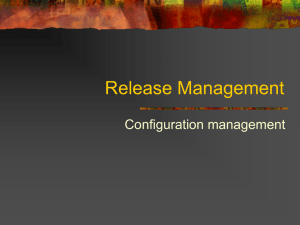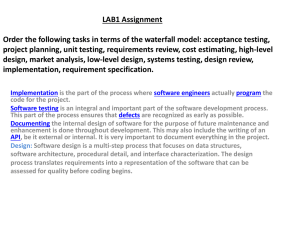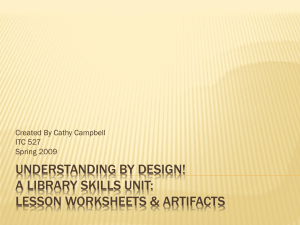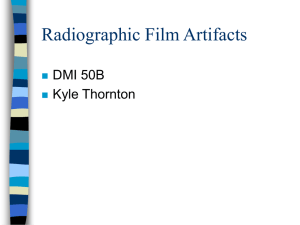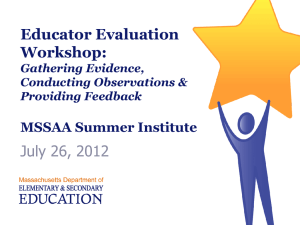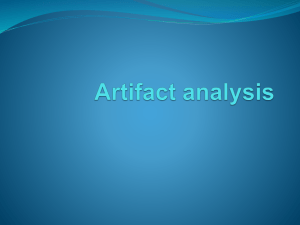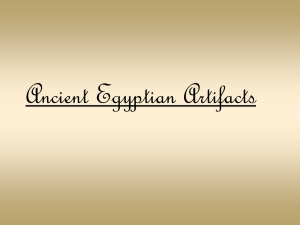Evidence 101: The Role of Artifacts in Educator Evaluation
advertisement
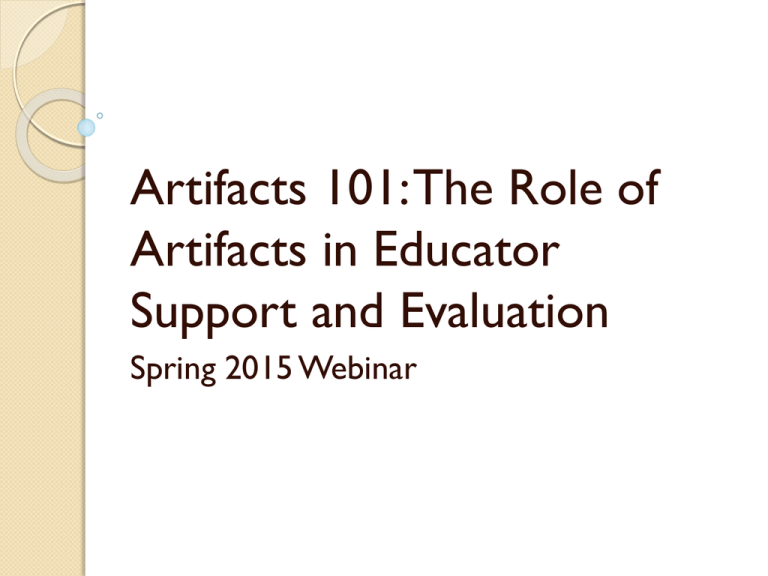
Artifacts 101: The Role of Artifacts in Educator Support and Evaluation Spring 2015 Webinar Outcomes Explain the three categories of evidence required by the Oregon Framework, and identify concrete examples of each Understand the role of artifacts in the evaluation process Identify a process that is efficient and effective and reduces redundancy 2 Self –Reflection Summative Evaluation Goal Setting Continuous Learning Observation/ Collection of Evidence Every educator and evaluator gathers evidence and assesses progress Observation/ Collection of Evidence Formative Assessment/Eval uation Every educator and evaluator gathers evidence and assesses progress 3 Three Types of Evidence 1. 2. Multiple measures of student learning & growth Evidence relevant to professional practice o Observations o Artifacts 3. Evidence relevant to professional responsibilities o Includes evidence collected by the educator and shared with the evaluator relating to progress toward professional goals 4 What is Evidence? the available body of facts or information indicating whether a belief or proposition is true or valid signs; indications Can be gathered “on stage” or “off stage” On Stage vs. Off Stage On Stage (Observations) ◦ What is seen – Aspects of teaching/leadership that are directly observable Off Stage (Artifacts) ◦ Behind-the-scenes work that has a significant impact on learning Artifacts Artifacts should be samples that demonstrates educator performance and impact ◦ Aligned with educator goals, the Oregon Model Core Teaching Standards, Oregon Educational Leadership/Administrator Standards, your district’s rubric, or school/district goals Possible Artifacts for Teachers Professional Practice Related to Standards Multiple Measures of Student Learning & Growth • Teacher-developed unit assessments • Student work (quizzes, • Student and staff homework, feedback presentations, etc.) • Grade-level meeting notes • Portfolios • Parent/teacher • Performance communication log assessments • PLC meeting notes • Interim assessments • Documentation of Professional Learning • State or district assessments • Lesson Plans • Notes/feedback forms from short, frequent observations (inside/outside classrooms) • Notes and feedback from announced observations • Email communications between educator and evaluator tied to practice Professional Responsibilities Related to Standards 8 Possible Artifacts for Administrators Professional Practice Related to Standards Multiple Measures of Student Learning & Growth Professional Responsibilities Related to Standards • Staff meeting plans/agendas • Building Rankings (School growth, subgroup growth) • Staff survey results • Parent/Principal communications • PTA meeting notes • Self-reflection • School/District Improvement Plan • Professional Goal Setting • Master Schedule • Staff Retention Rate • Documentation of Distributive Leadership (shared leadership) • Log of observations • Notes/feedback from observation meeting • Graduation Rate* • Notes and feedback from observation/post observation conference • National, international, district or school-wide developed assessments • Surveys about instructional leadership • Discipline Data* • Staff Communication • Teacher Professional Development *Not applicable to principals What does the Framework say? “The educator and evaluator collect evidence using multiple measures regarding student learning and growth, professional practice, professional responsibilities, and student learning to inform progress throughout the process of evaluation” Provides examples of artifacts for PP and PR www.ode.state.or.us/search/page/?id=3637 Setting Your District Up for Success Get Be Organized Strategic Communicate Expectations 1. Get Organized Adopt a process for organizing artifacts by Standard or Indicator and/or goals: ◦ Paper-based, email-driven, or online “cloudbased” system Identify key points of contact throughout the year to review artifacts Assign Responsibility ◦ Educator collects and submits artifacts throughout the evaluation cycle ◦ Evaluator organizes and analyzes artifacts 12 2. Be Strategic The more focused the Student Learning and Growth and Professional Goals, the easier it is to identify and collect artifacts. Share examples of artifacts during faculty or team meetings that provide evidence of more than one Standard or Indicator. Identify common artifacts that all or most educators might already be collecting (unit assessments, parent-teacher logs, etc.). Number of artifacts to collect varies by educator 13 3. Communicate Expectations Artifacts should be samples that demonstrates educator performance and impact Evidence should be clearly tied to educator goals, Standards, or Indicators Provide everyone with a clear idea of what, how, and when to share products of practice 14 Possible Processes Artifacts reviewed through the lens of the performance rubric vs. “artifact tool” Choice of artifacts left up to educator and evaluator vs. district required list of artifacts Other? Resources Toolkit www.ode.state.or.us/search/page/?id=3759 ◦ ODE recommended rubrics artifact templates ◦ Missouri Artifact Tool Resources from Districts www.ode.state.or.us/search/page/?id=3853 ◦ David Douglas “Artifact Ideas” for Danielson ◦ Specialist Rubrics Salem Keizer (specialists) Lebanon (non-building administrators) Additional technical assistance from ODE Questions? Contacts Educator Effectiveness Team: Tanya Frisendahl tanya.frisendahl@state.or.us Sarah Martin sarah.martin@state.or.us Sarah Phillips sarah.phillips@state.or.us Brian Putnam brian.putnam@state.or.us
